Across Sub-Saharan Africa, a quiet revolution is growing. From Kenya to Ghana, smallholder farmers are embracing Artificial Intelligence (AI) to tackle food insecurity, climate shocks, and resource inefficiencies. Once a futuristic vision, AI is now transforming how crops are grown, monitored, and harvested.
AI adoption in agriculture is booming, global investments are expected to rise from $1.7B in 2023 to $4.7B by 2028. In Africa, agri-tech funding skyrocketed from under $10M in 2014 to $600M by 2022. This shift is enabling farmers to use drones, sensors, predictive analytics, and computer vision to optimize irrigation, detect pests, and reduce crop loss.
Projects like Hello Tractor connect farmers with smart equipment via mobile apps, while platforms like the Kenya Agricultural Observatory provide real-time weather and planting data. Yet challenges persist: digital divides, lack of training, high costs, and concerns about data ethics.
✅ What Can Be Done?
1️⃣ Close the Digital Gap
Expand rural internet access and promote affordable AI tools for small farmers.
2️⃣ Invest in Farmer Training
Launch digital literacy programs focused on AI, data use, and precision farming.
3️⃣ Create Inclusive Policies
Build governance systems that protect data rights and promote ethical AI use.
4️⃣ Support Local Innovation
Fund youth-led agri-tech startups and ensure inclusive access for women and marginalized communities.
AI can unlock a food-secure, tech-driven future but only if we ensure equitable access and strong policy backing.
by E.D.
Join us to learn more: www.prosdoma.org
Source: World Bank Blogs, “Is Artificial Intelligence the Future of Farming?, 2025.#FoodSecurity #AIforFarming #SmartAgriculture #DigitalInclusion #Prosdoma #AfricaInnovation #ClimateAction #AgriTech
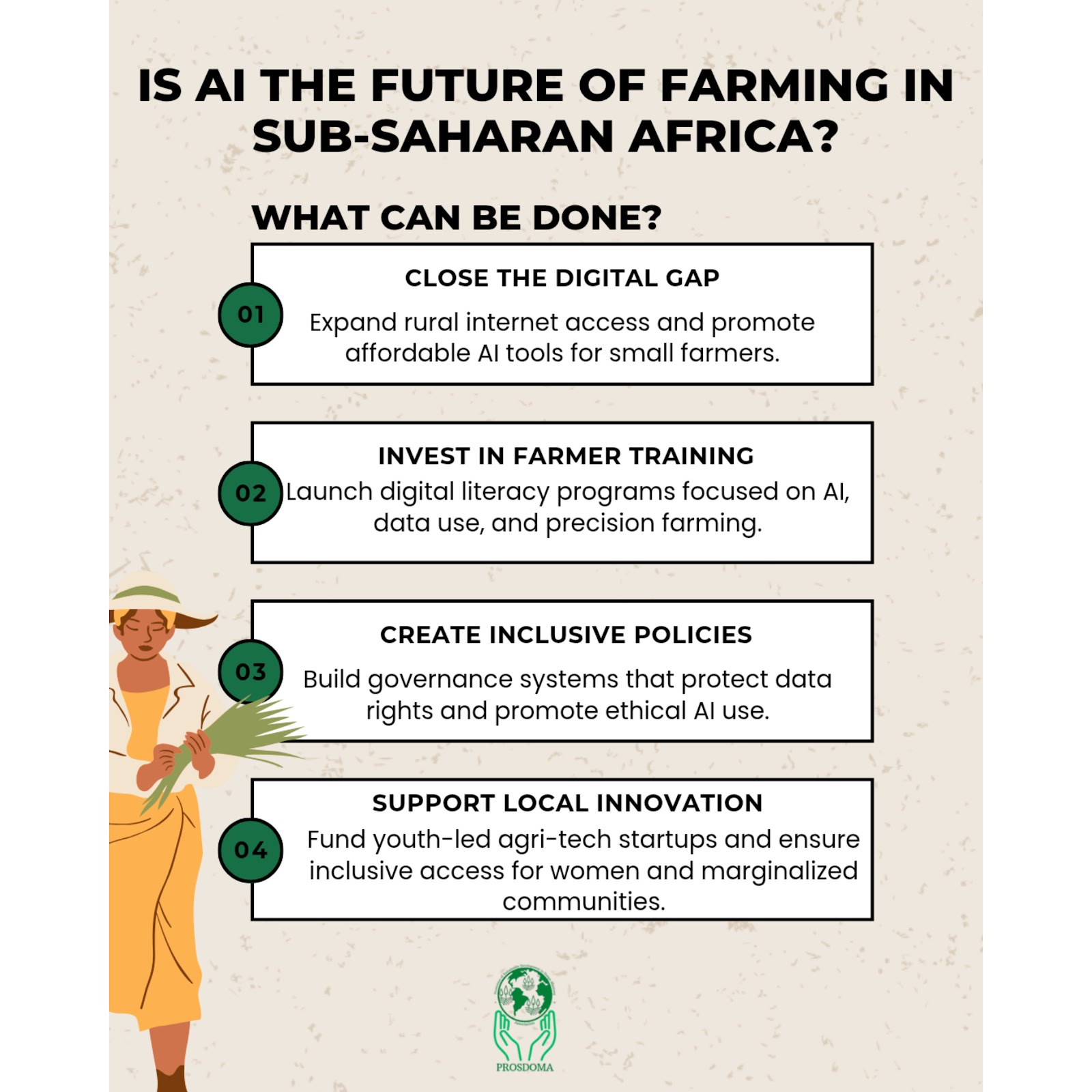
AI and the Future of Water Management: Smarter, Safer, More Resilient.
Water management is now at the center of the global sustainability conversation. With climate change, urban expansion, and poor planning degrading over 50% of the world’s freshwater, innovative solutions are urgently needed.
According to the World Economic Forum and the European Commission, investing in water resilience is not only a climate imperative, it’s a strategic opportunity.
This is where Artificial Intelligence (AI) steps in.
AI is rapidly transforming water utilities by enhancing demand forecasting, reducing energy waste, predicting system failures, and improving wastewater treatment. With tools like Xylem Vue, AI is powering real-time monitoring, dynamic optimization, and data-driven decision-making, helping utilities respond faster, cheaper, and more sustainably.
At PROSDOMA, we believe access to clean water is a human right and that equitable digital innovation must be part of the solution.
✅ What Can Be Done?
1️⃣ Invest in AI for Water Justice
Support digital tools that make water access smarter, especially in underserved regions.
2️⃣ Bridge the Tech Divide
Ensure marginalized communities have equal access to digital infrastructure and AI-driven utilities.
3️⃣ Foster Public-Private Collaboration
Scale AI solutions through inclusive partnerships between governments, innovators, and civil society.
4️⃣ Prioritize Environmental Standards
Use AI to meet strict ecological regulations and anticipate risks before they escalate.
Let’s build climate resilience through smart water systems. Learn more: www.prosdoma.org
by. E.D.
Source: World Economic Forum (2024), Xylem & Idrica – Water Technology Trends 2025
#WaterResilience #AIForGood #SmartWater #DigitalInnovation #Prosdoma #WaterJustice #ClimateAction #SDG6
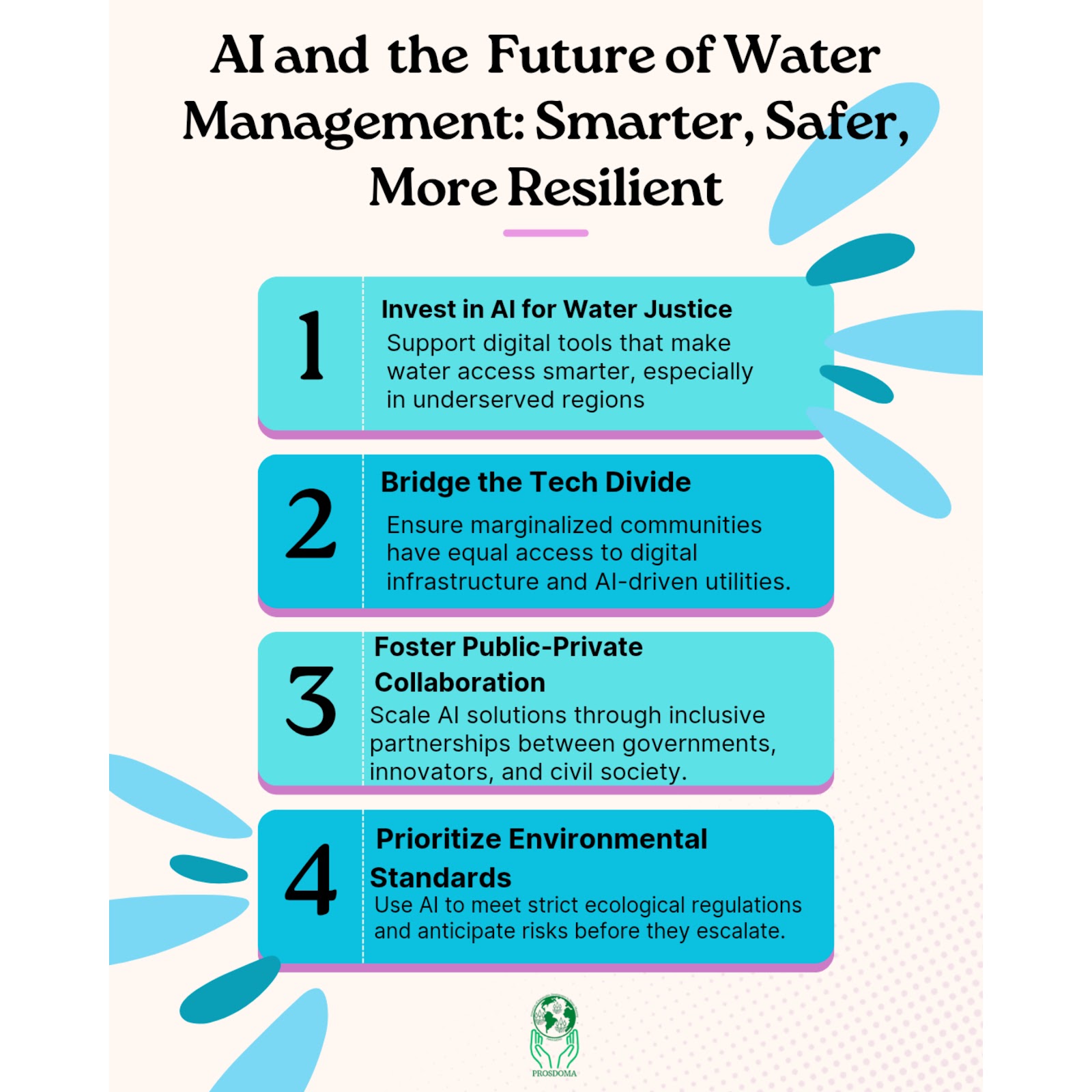
Glacier Preservation: A Hidden Key to Climate and Financial Stability
As climate change accelerates, glaciers, nature’s ancient water towers are disappearing at alarming rates. But what many overlook is that glacier loss is not just an environmental issue; it’s a financial risk.
According to the United Nations Environment Programme, the melting of glaciers threatens global water security, disrupts agriculture, and impacts over 1.9 billion people dependent on glacier-fed rivers. These risks ripple across economies, financial markets, and food systems.
In fact, climate-exposed sectors like insurance, agriculture, and energy face rising costs due to unreliable water flows and ecosystem collapse.
At PROSDOMA, we recognize that protecting glaciers isn’t just about conserving beauty, it’s about preserving livelihoods, food systems, and economic stability.
✅ What Can Be Done?
1️⃣ Finance Glacier Resilience
Redirect green finance to glacier-adjacent communities and climate adaptation projects.
2️⃣ Value Water in Investment
Integrate water risk into ESG frameworks and investment portfolios.
3️⃣ Protect Glacier Ecosystems
Support policies and international treaties that safeguard glacier regions from industrial exploitation.
4️⃣ Educate and Mobilize
Raise public awareness and engage the financial sector in glacier preservation efforts.
Water is wealth, let’s protect its source.
Learn more: www.prosdoma.org
by E.D.
Source: UNEP Finance Initiative (2025), “World Water Day 2025: Why Glacier Preservation Matters for Finance”
#WorldWaterDay #GlacierPreservation #ClimateFinance #WaterSecurity #Prosdoma #ESG #NatureBasedSolutions #ClimateActionNow
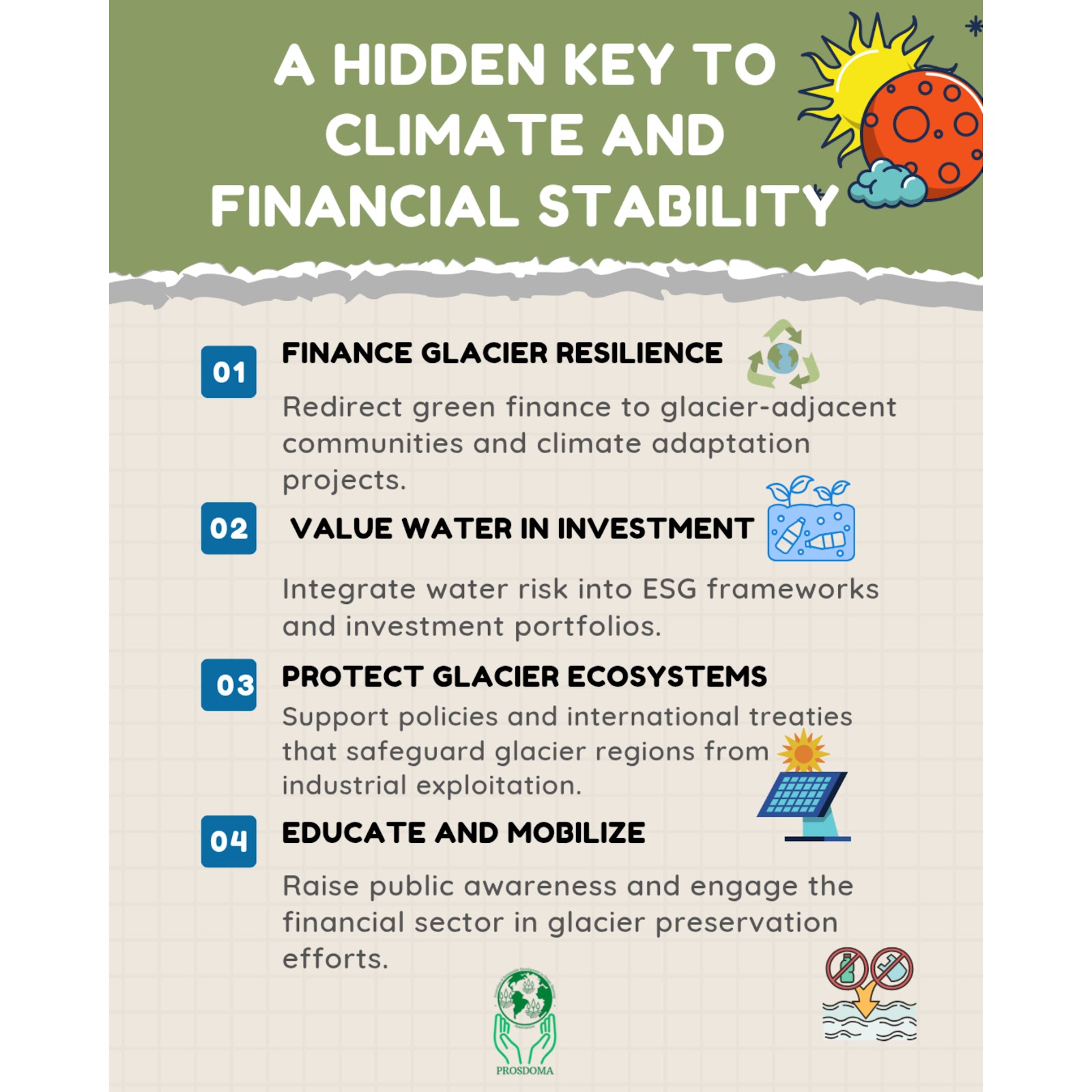
️ Resilience Starts with Food: Tackling Hunger in the Sahel & Horn of Africa
Climate shocks, conflict, and economic fragility have made the Sahel and Horn of Africa some of the most food-insecure regions in the world. Today, over 60 million people face hunger, malnutrition, and water stress, many of them women and children.
According to the FAO (2023), the key to long-term food and nutrition security lies in climate-resilient agriculture, community ownership, and integrated humanitarian-development approaches.
4 urgent realities:
1⃣ Rural communities are the most vulnerable.
Livelihoods are largely dependent on rain-fed agriculture, which is now unpredictable due to drought and desertification.
2⃣ Malnutrition is rising.
Over 14 million children under five are acutely malnourished across both regions.
3⃣ Women play a critical role.
Women are key to food production and nutrition, yet they lack access to land, credit, and training.
4⃣ Traditional aid is not enough.
Emergency responses must be paired with long-term investments in water access, climate-smart farming, and local capacity.
What can we do?
✅ Support agroecological and nutrition-sensitive agriculture
✅ Empower women and youth with resources and training
✅ Invest in early warning systems and local food systems
✅ Foster community-led adaptation strategies
At PROSDOMA, we stand with local changemakers building food resilience from the ground up. Food justice is climate justice.
Learn more: www.prosdoma.org
by E.D.
Source:
FAO. (2023). Enhancing Food and Nutrition Security in the Sahel and Horn of Africa. https://www.fao.org
#FoodSecurity #NutritionJustice #Sahel #HornOfAfrica #ClimateResilience #Agroecology #CommunityPower #Prosdoma
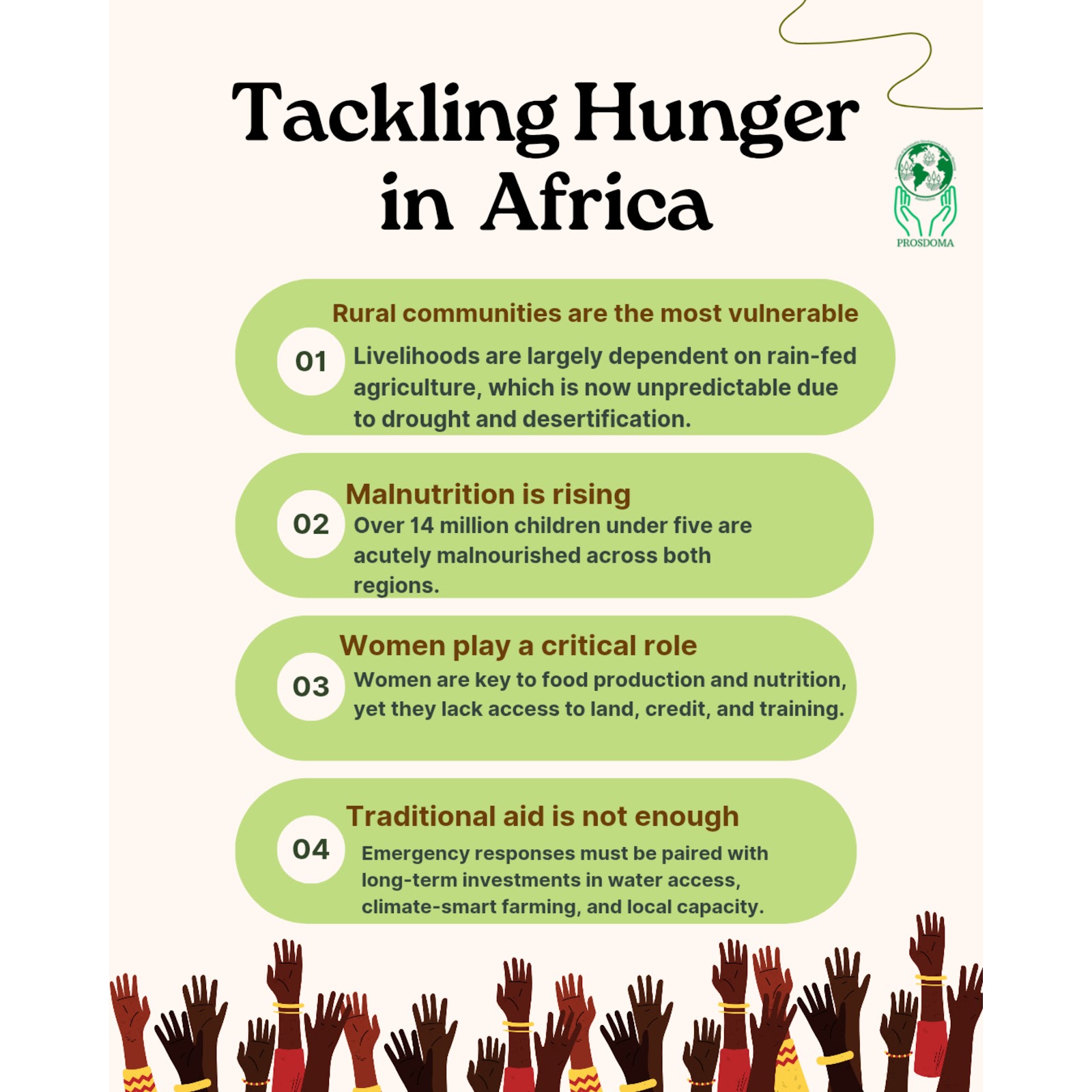
From Soil to Silicon: How AI is Reshaping Agriculture in 2025
At the 2025 World Economic Forum in Basel, Syngenta Group’s CEO Jeff Rowe declared it loud and clear: 2025 is the year AI will transform agriculture from the lab to the field.
Five key AI trends are defining this transformation:
1️⃣ AI in R&D :
Research projects use machine learning to identify new active ingredients.
2️⃣ AI in the Field:
Smart monitoring systems now generate real-time soil nutrient, carbon, and texture maps.
3️⃣ AI in Farmers’ Hands:
GenAI tools serve as personalized digital crop advisors.
4️⃣ AI in Pest Management:
Targeted protection reduces waste and overuse of chemicals.
The AgriTech market is expected to reach $54.17 billion by 2029, and AI in agriculture alone is projected to grow from $1.7B to $4.7B by 2028. According to the WEF, digital agriculture could boost the GDP of low- and middle-income countries by $450B annually.
But here’s the catch: technology must be accessible. At PROSDOMA, we believe the digital farming revolution must include smallholders, women, and rural communities, not leave them behind.
It’s not just about smart farms. It’s about fair farms.
Join us to cultivate an inclusive, tech-driven food future: www.prosdoma.org
By E.D.
Source:
Syngenta Group (2025). From Soil to Silicon: How Advanced Technologies are Cultivating the Future of Sustainable Ag. [Press Release via WEF & Bloomberg]
#AIinAgriculture #FoodSecurity #SmartFarming #TechForGood #AgriTech #SustainableAgriculture #DigitalInclusion #Prosdoma
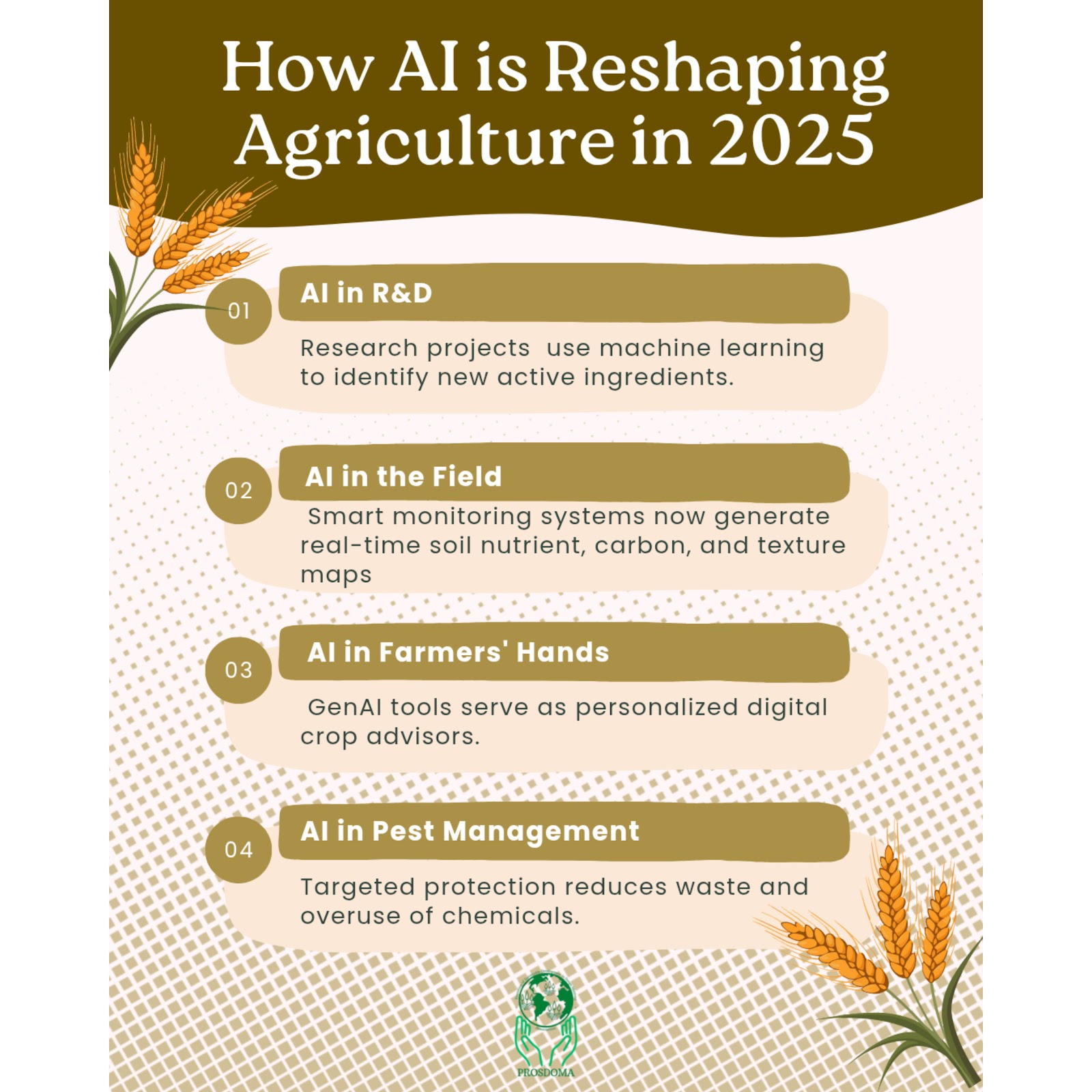

Leave a Reply